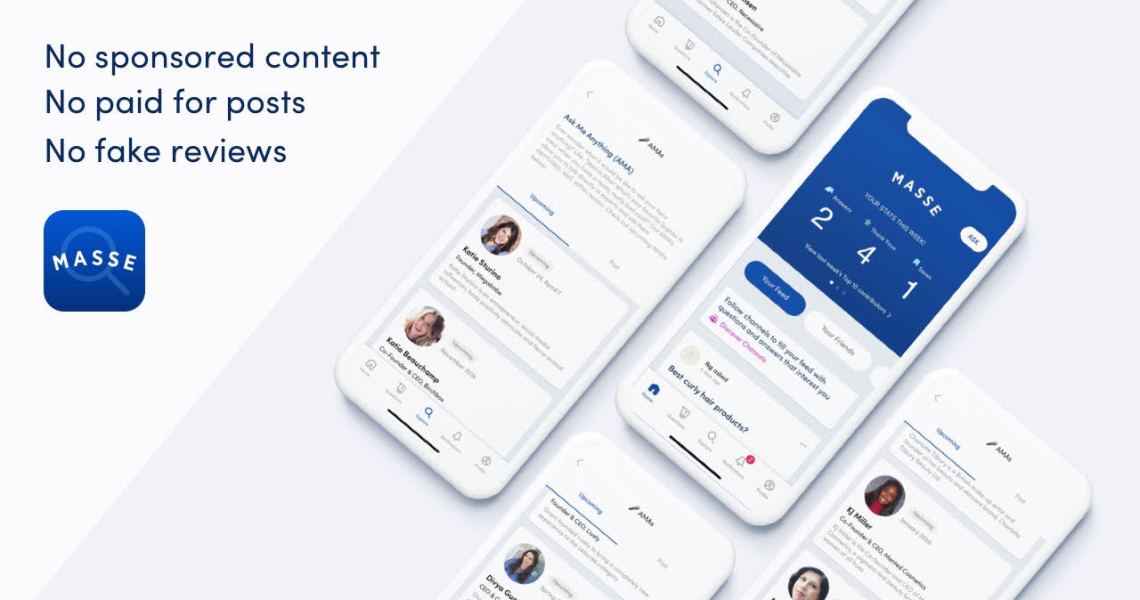As fake reviews continue to be a beauty industry problem, shopping app Masse is driving home its point about combatting sponsored content.
On Thursday, Masse will debut a Reddit-like “Ask Me Anything” series with eight brand founders, including Megababe’s Katie Sturino, Birchbox’s Katia Beauchamp and Wander Beauty’s Divya Gugnani. Six of the AMA sessions are focused on the beauty category as it is Masse’s most popular segment, said Elizabeth Shaffer, co-founder of Masse.
“The AMAs are striving to cut out the middlemen and any marketing, and amplify word-of-mouth recommendations,” said Shaffer. The participating founders and their respective brands are not receiving any sales commission on products or special promotions on Masse, beyond being featured in the Explore section of its app. Shaffer says this is a play at “brand equity” versus revenue for all parties.
In less than a year, Masse has built its subscriber base to more than 40,000. Its core customers are women between the age of 25 and 35 years old, and are mothers. On average, each of these users make eight recommendations a week, and 43% of users are making beauty product recommendations. Beauty companies that have the most recommendations are Glossier, Drunk Elephant, L’Oréal, CeraVe and Neutrogena.
In many ways, the AMAs serve as a larger brand awareness and PR push for the aforementioned founders. “Influencer marketing is at an interesting inflection point. From a business perspective, the value has been proven, but as a consumer, I personally feel uneasy about it,” said Beauchamp. “I’ve actually been off Instagram for several months and don’t find myself drawn to return. I like Masse’s focus on community. Birchbox took off, thanks to small communities of people embracing it and building it with.”
Gugnani agreed. “It’s harder and harder to find authentic product recommendations as a consumer. Influencers get paid to message a product, and we’ve seen reviews tainted [with fake recommendations] by brands,” she said. “AMAs also give me, as a CEO, insight into what the consumer really wants to know and cares about. That direct feedback is at the core of our strategy, from product development to marketing.”
Of course, AMAs are also available on Reddit and can be conducted at any time via IGTV or Instagram Stories with its question capability. Though the Masse-hosted Q&A will be Sturino’s first official AMA, she does regularly conduct questions and answers on her channel.
Masse’s goals to scale authentic recommendations are lofty, but whether it’s a solvent business model is unclear. For instance, the Federal Trade Commission is not pushing for Sunday Riley to admit wrongdoing after the founder and company were found guilty of orchestrating two years of fake reviews. The brand is also still carried by retailers like Sephora and Net-a-Porter.
Meanwhile, social shopping platform Influenster, which brands pay to provide their beauty samples in its VoxBoxes to beauty enthusiasts, was acquired by product review platform Bazaarvoice in August. It was last reported that Influenster hit $18 million in revenue in 2017. Still, the optics for a program like Influenster can be dicey. Customers could view it as pay-for-play, since brands are paying the platform to enable consumer discovery. Influenster said their pricing was confidential, but one industry source reported that brands’ entry into the platform is $25,000 for sampling and subsequent reviews on Sephora and Ulta.
“Of our 40 million total reviews, reviews generated by client programs only comprise 2 to 3% of that content,” said Elizabeth Scherle, Influenster president and cofounder. “The vast majority of our reviews are organic and non-incentivized — written by everyday consumers coming to us after a product purchase to share their experience.“
SwearBy, a platform that best mimics Masse, started as a beta app in November 2017 and moved to a website experience in October 2018. Like Masse, SwearBy’s audience is affluent women, largely ages 25 to 45, who are increasingly skeptical of five-star reviews. Fifty percent of the recommendations on SwearBy are in the beauty category. Its community of what it calls “Editors” are referred into the group, or they can apply to gain access. They also need to “swear” that are not being paid to write reviews before being accepted, said Kate Foster Lengyel, SwearBy founder and CEO. The company would not share the size of its subscriber base, but she said the platform saw a 400% jump in contributors when it moved from an app to a website.
As for ways to monetize its model, SwearBy conducts what Foster Lengyel calls market research for all its brands, including beauty, in exchange for an undisclosed fee. After gaining first access to products, customers can give feedback directly to the brand. This is an especially useful tool for an emerging beauty company. Beauty brands can also find SwearBy engagement in other ways: Last winter, the first 1,000 editors who gave 10 recommendations or more on the platform received a special beauty box from Fresh. Following that, Fresh saw three of its products land in the top 10 product recommendations on the platform. “Recommendations work, and so does sampling. It is a matter of trust and authenticity in how,” said Foster Lengyel.
For Masse, which is venture-backed and pre-revenue, Shaffer sees the opportunity to integrate the company’s platform into other retailers’ or brands’ sites as it looks to grow the business. Masse works with around 200 retailers, including Amazon, Nordstrom, Target and Moda Operandi, and over 1,000 brands have been recommended on the platform. “We see value in integrating this kind of trust across the web,” said Shaffer. “Anything we do from a business perspective is going to be mindful of the credibility we are establishing.”




